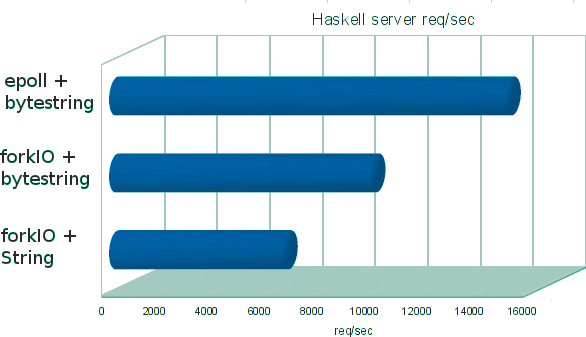Difference between revisions of "Simple Servers"
DonStewart (talk | contribs) |
m (Removing extra word 'be'.) |
||
| Line 83: | Line 83: | ||
=== Epoll-based event callbacks === |
=== Epoll-based event callbacks === |
||
| − | Now, instead of using the RTS' select mechanism to wake up threads, we use a custom epoll handler. Using epoll-based event handling, and bytestring IO. The epoll approach will |
+ | Now, instead of using the RTS' select mechanism to wake up threads, we use a custom epoll handler. Using epoll-based event handling, and bytestring IO. The epoll approach will replace GHC's select model soon ([http://github.com/tibbe/event/blob/master/src/System/Event/Thread.hs design here] showing how the concurrent Haskell primitives may be implemented in terms of epoll). |
<haskell> |
<haskell> |
||
Revision as of 08:12, 18 January 2010
Some example of simple web server designs in Haskell, using preemptive concurrency, or event-driven approaches. Requirements:
- Recent GHC
- Libraries: network, network-bytestring, event
Some more context on the background to this problem is available.
Benchmarks with httperf,
$ httperf --server=localhost --port=5002 --uri=/ --num-conns=10000
Author: dons
Results
Basic concurrent server
Concurrent, with String IO. Here on each accept from the main thread, we create a new Handle, and forkIO a lightweight Haskell thread to write a string back to the client. Relies on the runtime scheduler to wake up the main thread in a timely fashion (i.e. via the current 'select' mechanism).
import Network
import Control.Concurrent
import System.IO
main = withSocketsDo $ do
sock <- listenOn $ PortNumber 5002
loop sock
loop sock = do
(h,_,_) <- accept sock
forkIO $ body h
loop sock
where
body h = do
hPutStr h msg
hFlush h
hClose h
msg = "HTTP/1.0 200 OK\r\nContent-Length: 5\r\n\r\nPong!\r\n"
Measurements:
$ ghc -O2 --make A.hs- Request rate: 6569.1 req/s (0.2 ms/req)
Concurrent, with network-bytestring
Now, using bytestring IO (via the network-bytestring package) (but still using the rts' select-based preemptive threads). Just means we allocate nothing in the body, and avoid a couple of copies to do the IO.
{-# LANGUAGE OverloadedStrings #-}
import Data.ByteString.Char8
import Network hiding (accept)
import Network.Socket
import Network.Socket.ByteString (sendAll)
import Control.Concurrent
main = withSocketsDo $ do
sock <- listenOn $ PortNumber 5002
loop sock
loop sock = do
(conn, _) <- accept sock
forkIO $ body conn
loop sock
where
body c = do sendAll c msg
sClose c
msg = "HTTP/1.0 200 OK\r\nContent-Length: 5\r\n\r\nPong!\r\n"
Measurements:
$ ghc -O2 --make H.hs- Request rate: 9901.7 req/s (0.1 ms/req)
Epoll-based event callbacks
Now, instead of using the RTS' select mechanism to wake up threads, we use a custom epoll handler. Using epoll-based event handling, and bytestring IO. The epoll approach will replace GHC's select model soon (design here showing how the concurrent Haskell primitives may be implemented in terms of epoll).
{-# LANGUAGE OverloadedStrings #-}
-- A simple example of an epoll based http server in Haskell.
--
-- Uses two libraries:
-- * network-bytestring, bytestring-based socket IO.
-- - cabal install network-bytestring:
--
-- * haskell-event, epoll-based scalable IO events
-- - git clone git://github.com/tibbe/event.git
-- - autoreconf ; then cabal install
import Network hiding (accept)
import Network.Socket (fdSocket, accept)
import Network.Socket.ByteString
import Data.ByteString.Char8
import System.Event
import System.Posix
import System.Posix.IO
main = withSocketsDo $ do
sock <- listenOn $ PortNumber 5002
let fd = fromIntegral (fdSocket sock)
mgr <- new
registerFd mgr (client sock) fd evtRead
loop mgr
client sock _ _ = do
(c,_) <- accept sock
sendAll c msg
sClose c
msg = "HTTP/1.0 200 OK\r\nContent-Length: 5\r\n\r\nPong!\r\n"
Measurements:
ghc -O2 --make Epoll.hs- Request rate: 15042.6 req/s (0.1 ms/req)
So significantly better. By the way, under the same conditions, this Python epoll version achieves 10k req/sec.
